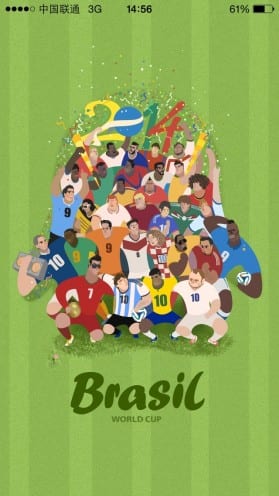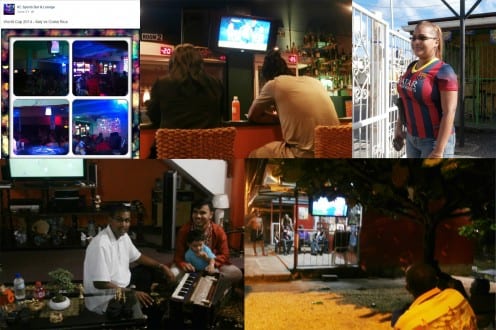Online and under the covers: the World Cup and social media in rural China
By Tom McDonald, on 27 June 2014

Post young man from North China fieldsite made on his WeChat profile. Caption reads “Essential preparation for watching football.” From left to right is beer, red bull, yoghurt, cigarettes and plate of red dates.
On first glance, taking a look around this small rural town in North China, the World Cup seems like it is a world away.
Being a football fan in the town has always been a minority pursuit. In general, adults don’t do much sport here: most are busy with work and family commitments. For those who do play sports, basketball, badminton and table tennis tend to be more popular, with both the primary and middle school having basic outside facilities for these sorts of activities. There is a gravel football pitch attached to the primary school, but this is rarely used by the school itself.
The town has its own unofficial amateur football team, a loose group of young men, (reminiscent of Sunday pub football teams) who organise evening practices on the middle school football pitch, and occasional matches through a QQ instant messaging group. Several times during the summer of 2013, the school tried to stop the team playing football altogether on the pitch, citing safety concerns. During the winter, the grim weather and shorter days mean members of the football team abandon evening practice altogether, preferring to play football on better artificial pitches in the nearby county-town during the weekend. This small group of hardcore football fans formed the bulk of my exposure to the World Cup, but they used social media to do it in a way that made it largely unobservable to most others.
Kicking-off: a World Cup under the covers
On the day that the World Cup started, I was awoken at 3:50 am by the sound of a WeChat message on my phone by the side of the bed. A short while after another arrived. And then another. And another. I reached over and, bleary-eyed, gazed at my phone screen. Four of my friends from the town had set up a WeChat conversation named ‘The world accelerating’ (jiasu shijie) and were talking between themselves on it. It took a second until I could figure out what they were doing: sending messages to each other talking about the opening game of the World Cup, while the game unfolded.
One of the major downsides of the World Cup being located in Brazil is the staggering inconvenience this happens to have caused Chinese football fans. There is a 11-hour time difference between Brasília and Beijing, and this means that all of the matches kick-off somewhere between midnight and 6am local time, making it extremely difficult for young men to make time for watching football between normal patterns of work, family and sleep. For this reason this World Cup, more than any I have ever witnessed in China, is one that relies enormously on the internet.
‘The world accelerating’ WeChat group chat was important because it allows this small group of men to feel like they are watching football together. There is no place in the town that they could gather to watch the game (all businesses in the town close at 9pm, and unlike Chinese cities there are no bars here). Even though many of these men were watching at home they still made this a real group experience. This was furthered by the fact that their conversations were almost completely conducted via the WeChat’s asynchronous voice messaging feature (which is quite a contrast to the normal conversations on the football team’s QQ group which is conducted almost entirely through text).
The friendliness and companionship of these young men was really prevalent when listening to these world cup messages. There was a real since of ‘blokey’ fun behind it all. The voice messages are all in thick local dialect, interspersed with exuberant swearing, such as “that shot was the bull’s p*nis!” (nage qiu hen niubi). Bits of chat about work between friends, who also co-operate with each other in business was interrupted with someone excitedly saying “It’s starting, it’s starting…” at the commencement of the game. Despite it being 4am, and each of them being in their beds at home, the WeChat atmosphere it reminded me of watching football matches in pubs in the UK.
The group was also full of other matey lad banter. One person leaves a voice message saying “Come on, bottoms up, bottoms up” (kuaidian, ganbei ganbei) suggesting alcohol consumption. Someone posts pictures of pretty young Chinese women. It’s perhaps gratifying that even at 4 am in rural China you can get beer, girls and football – at least via WeChat.
The fact that all this takes place in the middle of the night makes it all the more magical. There is something almost improper about it. At one moment one of them leaves a We Chat message of him shouting excitedly, and one of the others jokes “don’t wake up your wife!” (bie ba ni xifu naoxing). I have a wonderful mental image of all these men, in their 20s and 30s, under the covers in bed, smartphone in one hand chatting to friend, tablet in the other watching the match. Or in dark hotel rooms with the TV on at the end of the bed, with droopy-eyed and struggling to stay awake. As one person told me “If you don’t watch with friends, it’s no fun” (bu gen pengyou yiqi kan, jiubu hao wan). Having friends around via WeChat is perhaps one of the ways to get you through this. At the end of the match, one of the young guys even said, “OK OK, everyone go to bed. Everybody’s tired”
The internet World Cup
 Apart from this small group of avid fans who are willing to stay up late into the night watching these games, for others only vaguely interested in football, social media becomes a key point through which World Cup information is disseminated nationwide. As mentioned in a previous blogpost, QQ and WeChat both combine news delivery with social media. Both platforms have heavily featured World Cup related stories. Between 13-16 June 2014 inclusive, 8 out of the 37 news stories on QQ Tencent news were World Cup related, on WeChat that figure was 9 out of 37. On the first day of the tournament, QQ mobile featured a special ‘startup screen’ (kind of similar to a Google doodle) of the QQ penguin logo made up of lots of football players. The QQ homepage has a special section dedicated to the World Cup, where entire matches and compilations of goal-scoring moments can be watched at a more suitable time.
Apart from this small group of avid fans who are willing to stay up late into the night watching these games, for others only vaguely interested in football, social media becomes a key point through which World Cup information is disseminated nationwide. As mentioned in a previous blogpost, QQ and WeChat both combine news delivery with social media. Both platforms have heavily featured World Cup related stories. Between 13-16 June 2014 inclusive, 8 out of the 37 news stories on QQ Tencent news were World Cup related, on WeChat that figure was 9 out of 37. On the first day of the tournament, QQ mobile featured a special ‘startup screen’ (kind of similar to a Google doodle) of the QQ penguin logo made up of lots of football players. The QQ homepage has a special section dedicated to the World Cup, where entire matches and compilations of goal-scoring moments can be watched at a more suitable time.
Despite the challenges of football being a minority pursuit here in this rural Chinese town, and the difficulties of following the World Cup given the time difference between Brazil and China, I have nonetheless been struck by how people are using social media and the internet to create the kind of tournament experience that appeals to them, and most importantly, share in that experience with their friends.
THE WORLD CUP ON SOCIAL MEDIA WORLDWIDE
This article is part of a special series of blog posts profiling how social media is affecting how ordinary people from communities across the planet experience the 2014 World Cup.
- Brazil: “Why aren’t they protesting?”: low-income Brazilian’s views on the World Cup
- Chile: Seeing red: watching the World Cup in Northern Chile
- China (North): Online and under the covers: the World Cup and social media in rural China
- China (South): “Watch the World Cup – watch the fun and the world”
- India: Football World Cup 2014: Observations from Panchagrami
- Italy: ‘We are more united for the World Cup than for Christmas!’: the World Cup in Italy
- Trinidad: “It ain’t ova till its ova” – Spectacular sports and social media: the World Cup in El Mirador
- Turkey: “Turks have no other friends besides the Turks” – a Turkish saying
- United Kingdom: Englishness, the World Cup and the Glades
 Close
Close










